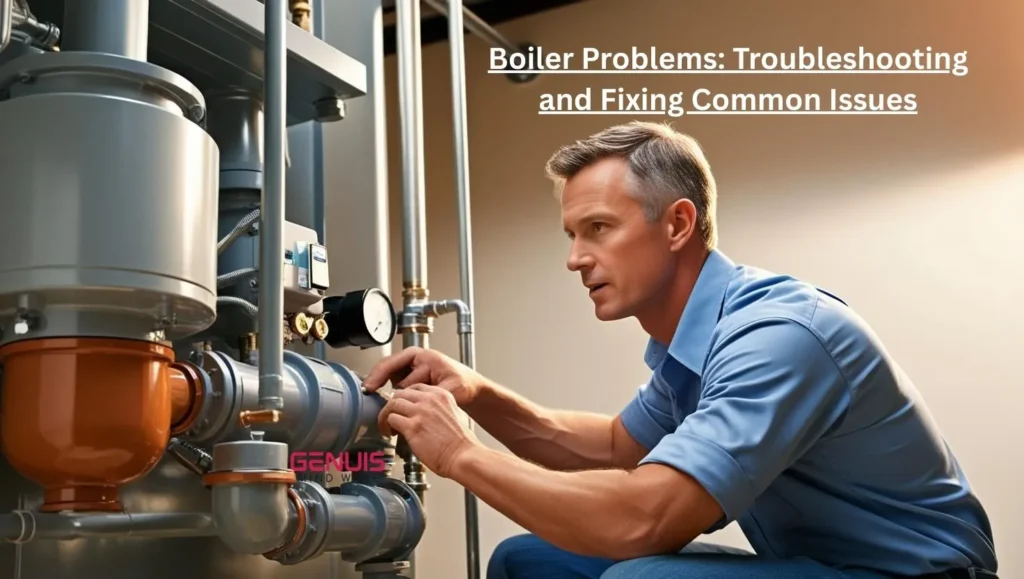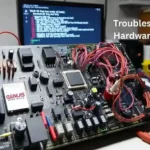What are boiler problems? Today I will tell you where this boiler is used. Friends, in this article, you will be informed in full detail about boilers and boiler troubleshooting.
Welcome to the Boiler Troubleshooting Guide. Our goal is to help you deal with common boiler problems. It is very important to know these problems.
By solving these problems quickly, you avoid expensive repairs. This article will tell you how to find and fix boiler problems. We cover everything from too little heat to a noisy boiler.
Find solutions to common boiler problems with our expert guide on how to solve boiler problems.
What is a boiler?
A boiler boils water in a power heating system and provides hot water. It runs on gasoline, oil, or electricity. It also transfers heat to the water through a heat exchanger. The hot water is then transported through pipes to radiators or taps.
Sometimes boiler problems arise as a result of component failure or low pressure. Regular maintenance helps to avoid these concerns.
How Many Kinds of Boiler?
Combi boiler:
This boiler provides hot water and heating without a storage tank. It takes up less space and is ideal for smaller homes, but it can cause problems if demand is high.
System boiler:
This boiler uses a cylinder to store hot water. It supplies many taps at the same time. Sometimes, boiler problems arise when the pressure drops.
Conventional boiler:
Requires a tank and cylinder to store water, making it a great choice for larger homes with high water usage. However, if the tank leaks, the boiler will experience problems.
Boiler Troubleshooting and Fixing Common Issues
Fixing boiler problems needs a good understanding of its parts. This section talks about common issues and how to solve them. You can make your boiler work better by fixing thermostat problems, pilot light issues, faulty valves, and expansion tank problems.
The pilot light keeps going out.
Boiler problems can happen if the pilot light goes out often. This issue may be due to a dirty pilot or a weak gas supply. First, check if dirt is blocking the flame.
If the problem continues, cleaning the pilot or calling a technician can help. For example, if the pilot light flickers and shuts off, dust buildup might be the reason.
The boiler is making noise (rumbling, whistling, or banging).
Unusual noises can be a sign of serious boiler problems. These sounds often happen when limescale builds up inside the boiler. If the system makes a banging noise, trapped air or dirt in the pipes could be the cause.
Bleeding the radiators or descaling the boiler can fix this. For example, if a whistling sound comes from the boiler, it might be due to high pressure.
No hot or cold water.
A broken boiler can stop water from heating or cooling properly. Low pressure, a faulty thermostat, or a damaged valve can cause this issue. First, check the pressure gauge and thermostat settings.
If water is not heating, replacing a faulty heating element may solve the problem. For example, if cold water flows instead of hot, the heating system might need repair.
The boiler is leaking.
Boiler problems can occur if there is a water leak. A damaged pipe or a faulty valve often causes this issue. First, check for water around the boiler.
If the leak is small, tightening the valve may help. For example, if water drips from the bottom, a worn-out seal might need replacement.
Low boiler pressure
A boiler needs the right pressure to work properly. If the pressure is too low, heating may not work well. A leak or a faulty pressure valve can cause this problem.
First, check the pressure gauge. If the pressure is low, adding water to the system can fix it. For example, if the pressure gauge shows a drop, refilling the boiler may help.
Radiators are cold/faulty.
Cold radiators can be a sign of serious boiler problems. Trapped air, dirt buildup, or a broken valve may cause this issue.
First, touch the radiator to check for uneven heating. Bleeding the radiator can fix trapped air. For example, if the top is cold and the bottom is warm, releasing air can help.
The boiler is rumbling.
Boiler problems can happen if there is too much limescale inside. This buildup can block water flow and cause a rumbling noise.
First, check if the sound gets louder over time. Cleaning the boiler with a descaler can help. For example, if the noise sounds like a kettle boiling, limescale removal may fix it.
The boiler is not responding to the thermostat.
A faulty thermostat can cause heating problems. If the boiler is not starting, the thermostat may not be working. First, check that it is set correctly.
Replacing the batteries or resetting them may help. For example, if the room remains cold even after adjusting the thermostat, a replacement may be needed.
Frozen condensate pipes
Boiler problems can occur in winter when pipes freeze. A frozen condensate pipe can stop the boiler from working.
First, check if the pipe outside feels icy. Pouring warm water over it can help. For example, if the boiler shuts down after cold weather, thawing the pipe may fix the issue.
The boiler won’t turn on (no power).
Boiler problems can occur if there is no power. First, check if the power switch is on. If not, turn it on and see if the boiler starts. Also, a tripped circuit breaker can stop the boiler. Resetting the breaker may solve the issue.
Hot water but no heating
Sometimes, the boiler provides hot water but does not heat the home. This issue may happen due to a faulty diverter valve.
First, check if the radiators are warm. If they stay cold, the valve might be stuck. Replacing it can restore heating.
The boiler is not heating water.
Boiler problems can arise if the thermostat or gas supply is not working. First, make sure the thermostat is set correctly.
The gas supply might be off if the boiler does not heat water. Turning it on or calling a professional can help.
Expansion Tank Issues
Boiler problems happen if the expansion tank does not have the right pressure. First, check the tank to keep the system working properly.
If the air pressure is too low, it can cause issues. Check it regularly to avoid trouble. Adding air or replacing a damaged tank can help fix the problem.
Noisy Boiler
A noisy boiler may be nothing more than an annoyance. It often indicates an underlying problem. Common sounds include banging, whistling, or rumbling, which are usually the result of trapped air within the system or a pump malfunction.
This noise could indicate air bubbles blocking water flow or cracked components. Addressing a noisy boiler immediately can prevent further heating system problems.
Do You Need A New Boiler?
Boiler problems can make your heating unreliable. First, check if a repair can solve the problem. If your boiler is old or breaks down frequently, a new one may be needed. A new boiler works better and saves energy. Replacing it on time prevents sudden failures.
Conclusion
Boiler problems can make your boiler run cold and uncomfortable. Regular checks help to find problems early. This prevents costly repairs and sudden breakdowns.
Knowing your heating system helps you make smart repair choices. Plus, knowing how to fix small problems keeps your heating system working well. Taking care of your boiler ensures you stay warm all winter long.



